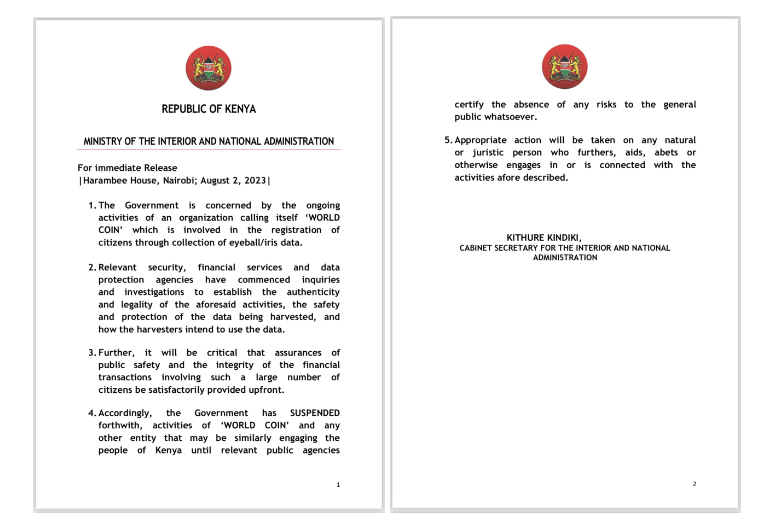- Worldcoin has faced a halt in Kenya as the government raises concerns about privacy and security risks
- The Kenyan authorities have suspended Worldcoin’s activities until relevant agencies verify the absence of potential risks to citizens
- Worldcoin’s digital ID system, based on iris scans for proof of personhood, aims to distinguish humans from AI
Worldcoin, a new cryptocurrency and digital identity project, has encountered a sudden halt to its digital registration process in Kenya. The government has taken decisive action to suspend all local activity related to the cryptocurrency. On August 2, Kenya’s Cabinet Minister of Internal Security made an official announcement on Facebook, which stated that the country has suspended Worldcoin’s operations. This was until relevant public agencies certified the absence of any potential risks to Kenyan citizens.
“The government has suspended forthwith activities of Worldcoin and any other entity that may be similarly engaging the people of Kenya until relevant public agencies certify the absence of any risks to the general public whatsoever,” the statement read in part.
Cabinet Minister Kithure Kindiki emphasized that the government was particularly concerned about Worldcoin’s practice of collecting sensitive identification information. The means of data collection includes iris scans, in exchange for a digital ID. The process raised alarm regarding privacy and security issues. It then prompted the government to initiate inquiries and investigations into the authenticity and legality of Worldcoin’s activities.
In response to the situation, the Kenyan government stated that it would take appropriate action against any individual or entity involved in or supporting the activities related to Worldcoin. This clear and firm stance reflects the government’s commitment to safeguarding the interests and rights of its citizens.

READ: Scary risks in the Worldcoin biometric proof-of-personhood system
The Worldcoin project was officially launched on July 24, 2023. However, after three years of development, it has garnered significant attention due to its co-founder, Sam Altman, who is also the CEO of OpenAI. OpenAI is the company behind the well-known AI-based chatbot, ChatGPT. Worldcoin’s mission is centred around the belief that as AI technology advances, distinguishing between humans and online bots will become increasingly challenging. To address this issue, the startup devised a digital ID system based on the concept of proof of personhood.
The process involves scanning an individual’s iris to generate a unique digital ID. This ID is referred to as a World ID. By doing so, Worldcoin aims to create a reliable and verifiable way of distinguishing genuine human users from AI bots. According to Worldcoin, this will enhance online security.
Despite the ambitious vision behind Worldcoin’s project, its approach has faced scrutiny and scepticism from the Kenyan government. The collection of biometric data, particularly iris scans, raises significant privacy concerns, and the government is determined to ensure that any potential risks are thoroughly assessed before allowing the project to proceed within its borders.
The Kenyan authorities’ actions demonstrate a proactive approach to managing emerging technologies. These techs include cryptocurrency and digital identity projects. The authorities are charged to protect citizens from potential risks and ensure compliance with existing regulations.
READ: Worldcoin publishes audit report addressing data security concerns
It is worth noting that the use of biometric data in digital identity systems has been a subject of debate in many countries worldwide. Critics raise concerns about privacy, potential misuse, and the risk of data breaches. However, proponents argue that biometrics offers a secure and accurate way of verifying identities,
In light of the Kenyan government’s intervention, Worldcoin will need to work closely with relevant agencies to address the concerns raised and demonstrate its commitment to protecting users’ privacy and data security. Moreover, the project may have the opportunity to gain their trust and find a path forward. This is by engaging in an open and transparent dialogue with the authorities,
As the world becomes increasingly interconnected, digital identity solutions are gaining traction as a means to enhance security, streamline processes, and improve access to services. However, striking the right balance between technological innovation and safeguarding individual rights remains a complex challenge.
While the startup’s mission to address the growing challenges of differentiating humans from AI is commendable, the use of iris scans for digital identity has raised legitimate concerns. Moving forward, a collaborative approach that prioritizes user privacy and security will be essential for Worldcoin. This is if they need to gain acceptance and foster a positive relationship with the Kenyan authorities and its potential users. As the landscape of digital identity continues to evolve, striking a delicate balance between innovation and ethical practices will be critical for the sustainable growth of such projects in an increasingly digital world.
- SEO Powered Content & PR Distribution. Get Amplified Today.
- PlatoData.Network Vertical Generative Ai. Empower Yourself. Access Here.
- PlatoAiStream. Web3 Intelligence. Knowledge Amplified. Access Here.
- PlatoESG. Automotive / EVs, Carbon, CleanTech, Energy, Environment, Solar, Waste Management. Access Here.
- BlockOffsets. Modernizing Environmental Offset Ownership. Access Here.
- Source: https://web3africa.news/2023/08/03/news/kenya-suspends-worldcoin-iris-scan-registration/
- :has
- :is
- 2023
- 24
- a
- About
- acceptance
- access
- According
- accurate
- Action
- actions
- activities
- activity
- address
- addressing
- advances
- After
- against
- agencies
- AI
- aims
- alarm
- All
- Allowing
- also
- ambitious
- an
- and
- Announcement
- any
- approach
- appropriate
- ARE
- argue
- around
- AS
- assessed
- attention
- audit
- AUGUST
- August 2
- authenticity
- Authorities
- Balance
- based
- BE
- become
- becomes
- been
- before
- behind
- belief
- between
- biometric
- biometrics
- borders
- bots
- breaches
- by
- ceo
- Certified
- certify
- challenge
- challenges
- challenging
- charged
- chatbot
- ChatGPT
- Citizens
- clear
- closely
- Co-founder
- Cointelegraph
- collaborative
- Collecting
- collection
- commendable
- commitment
- company
- complex
- compliance
- concept
- concerned
- Concerns
- continues
- countries
- country
- create
- critical
- Critics
- cryptocurrency
- data
- Data Breaches
- data security
- debate
- decisive
- demonstrate
- determined
- Development
- dialogue
- digital
- Digital ID
- digital identity
- digital world
- distinguish
- doing
- due
- emerging
- emerging technologies
- emphasized
- engaging
- enhance
- ensure
- entity
- essential
- ethical
- evolve
- exchange
- existing
- faced
- Find
- Firm
- For
- Forward
- Foster
- from
- Gain
- gaining
- General
- general public
- generate
- genuine
- Government
- Growing
- Growth
- Have
- However
- HTTPS
- human
- Humans
- ID
- Identification
- identities
- Identity
- IDENTITY SOLUTIONS
- if
- improve
- in
- include
- includes
- increasingly
- individual
- information
- initiate
- Innovation
- Inquiries
- interconnected
- interests
- internal
- intervention
- into
- Investigations
- involved
- issue
- issues
- IT
- ITS
- July
- kenya
- landscape
- launched
- legitimate
- light
- local
- made
- managing
- many
- May..
- means
- Mission
- misuse
- Moreover
- moving
- Need
- New
- noting
- of
- Offers
- official
- Officially
- on
- online
- online security
- open
- OpenAI
- Operations
- Opportunity
- or
- Other
- part
- particularly
- path
- People
- plato
- Plato Data Intelligence
- PlatoData
- positive
- potential
- practice
- practices
- privacy
- Privacy and Security
- Proactive
- process
- processes
- project
- projects
- proof
- proponents
- protect
- protecting
- public
- Publishes
- raise
- raised
- raises
- Read
- referred
- reflects
- regarding
- Registration
- regulations
- related
- relationship
- relevant
- reliable
- remains
- report
- response
- right
- rights
- Risk
- risks
- safeguarding
- Sam
- Sam Altman
- scanning
- scrutiny
- secure
- security
- sensitive
- Services
- significant
- Similarly
- situation
- So
- Solutions
- startup
- stated
- Statement
- streamline
- subject
- such
- sudden
- Supporting
- Suspend
- suspended
- sustainable
- Sustainable Growth
- system
- Systems
- Take
- taken
- technological
- Technologies
- Technology
- TECHs
- that
- The
- The Landscape
- the world
- their
- then
- These
- they
- this
- thoroughly
- three
- to
- traction
- transparent
- Trust
- unique
- until
- use
- User
- user privacy
- users
- verifiable
- verify
- verifying
- vision
- was
- Way..
- well-known
- which
- WHO
- will
- with
- within
- Work
- world
- worldwide
- worth
- would
- years
- zephyrnet













